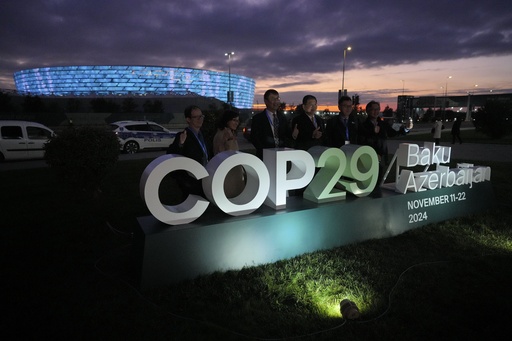BAKU, Azerbaijan — In the inaugural week of the United Nations climate discussions, the focus shifted more toward distractions than productive deals, leaving critical financial agreements unresolved. The negotiations, known as COP29, which are being held in Baku, are expected to gain traction as government ministers arrive to address key political bargaining.
The disparity in financial commitments between wealthy and developing countries remains significant, with an estimated one trillion dollars gap to be addressed. Developing nations are collectively advocating for a comprehensive financial package totaling approximately $1.3 trillion to assist in transitioning away from fossil fuels, adapting to climate change effects, and addressing damage caused by climate-related disasters. Meanwhile, wealthier nations like the U.S. and Canada are proposing considerably lower figures, suggesting a floor of $100 billion, creating a stark contrast between the two sides.
Debbie Hillier, a policy expert at Mercy Corps, highlighted the unified stance of developing nations, emphasizing their need for the higher amount, while expressing concern over the lack of commitment from developed countries to disclose a total figure. Harjeet Singh, associated with the Fossil Fuel Non-Proliferation Treaty Initiative, echoed this sentiment, pointing out the absence of transparency from donor nations regarding their financial commitments, which he termed unsettling.
Simon Stiell, the United Nations Climate Secretary, called for expedited negotiations on key issues, stating that the future capacity to halve global emissions within this decade and protect lives from escalating climate impacts hangs in the balance in Baku. There remains a considerable distance between the negotiating parties, which is typical for this stage of discussions. Ani Dasgupta, president of the World Resources Institute, noted that it’s now time for ministers to step in and make politically significant decisions as negotiations transition from technical details to substantial monetary agreements.
Inger Andersen, Executive Director of the United Nations Environment Programme, noted that the slow progress is frustrating but cautioned against drawing conclusions after just one week of negotiations, given the dynamic nature of such talks. Avinash Persaud, a special climate adviser at the Inter-American Development Bank, commented that the cautious yet tense atmosphere of COP negotiations often leads to chaotic appearances, driven by high stakes and urgency as deadlines loom.
The discussions will continue against the backdrop of the G20 meeting happening simultaneously in Brazil, where ministers from the world’s leading economies will deliberate on climate policies while being responsible for a significant percentage of global greenhouse gas emissions. This convergence may influence outcomes in Baku as countries look to align their critical commitments.
As the second week approaches, the role of the COP29 president, Mukhtar Babayev, will be essential in galvanizing the negotiators toward a consensus. Babayev’s approach contrasts with previous COP leaders, opting for a more diplomatic strategy rather than a confrontational one. He expressed optimism regarding early progress but acknowledged substantial work ahead.
Throughout the first week, several distractions emerged, including a contentious speech by host country President Ilham Aliyev, who criticized neighboring Armenia and mainstream media while controversially referring to oil and gas as a “gift from the Gods.” This was followed by tensions resulting in significant diplomatic fallout, including France’s environment minister withdrawing from discussions, and Argentina’s decision to potentially exit the Paris Agreement.
Further complicating matters, a letter from former United Nations officials calling for reforms sparked debate about misinterpretation among negotiators. Activists have criticized the ongoing talks for being overly aligned with fossil fuel interests, pointing to Azerbaijan’s status as a major oil producer and noting that many participants have existing ties to the fossil fuel sector.
Despite these challenges, several leaders expressed cautious optimism as they emphasized the urgency of maintaining the target of limiting global temperature increases to 1.5 degrees Celsius, a crucial goal established during the Paris climate talks. Cedric Schuster, Chair of the Alliance of Small Island States, highlighted the need for concerted efforts, particularly from developed nations, to engage in meaningful discussions about required financial commitments.
Similarly, comments from climate experts like Bill Hare urged a heightened sense of urgency, stating that despite natural disasters and climate crises experienced recently, the discussions in Baku have yet to reflect this pressing need for action. The coming week will be critical for hallmark decisions shaping the future of global climate efforts.


